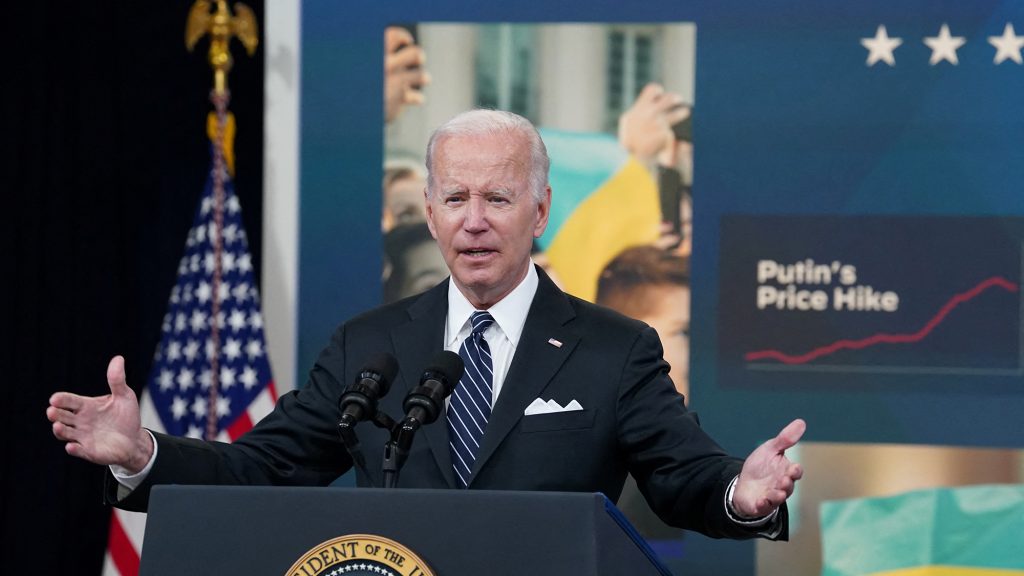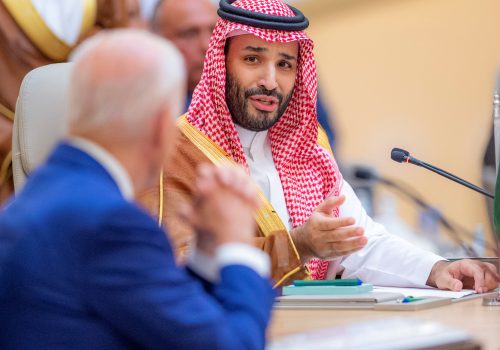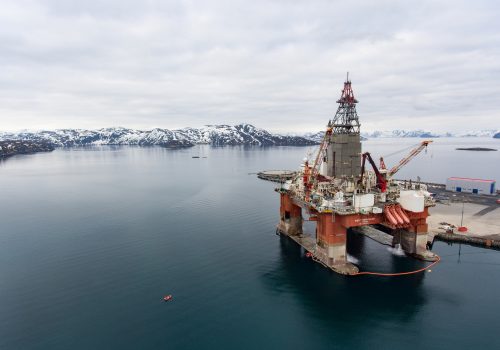Russian President Vladimir Putin has declared an energy war against the West. Even before invading Ukraine in February, Russia began reducing natural gas exports to European countries in 2021, and throughout much of 2022 it has blockaded Europe-bound Kazakhstani crude oil exports. The sabotage of the Nord Stream 1 and 2 pipelines in late September suggests that a new, more dangerous phase in Putin’s energy war has begun.
Europe must assume that it will get no Russian gas this winter. Putin has already cut off most Russian gas exports to the continent. The situation matters not only to Europeans, who face a difficult winter, but also to the United States and to transatlantic unity, including on issues such as continued military, economic, and—most importantly—political support to Ukraine. Putin’s energy war seeks to undermine his opponents on both sides of the Atlantic.
Washington can do more to mitigate this crisis. The United States must continue to work to increase cleaner gas production and to coordinate with European allies to find additional sources of liquefied natural gas (LNG), including from the United States. The Biden administration should also, in cooperation with Brussels, consider using its trade agencies to assist with short-term natural gas and infrastructure project financing. Both sides must encourage a reduction in energy demand and work to develop new clean technologies as well.
Regarding oil, the United States will continue to release large volumes of crude oil from the Strategic Petroleum Reserve (SPR), and the administration has committed to refilling the SPR when West Texas Intermediate crude trades at or below sixty-seven to seventy-two dollars per barrel. (The current price is about eighty-five dollars.) With the United States and its allies facing an increasingly hostile oil market, it may be worth revisiting prior efforts to expand the SPR to one billion barrels. Finally, there are also interesting proposals about enabling the SPR to write futures contracts. These measures, by incentivizing domestic crude production, would increase world supply and constrain Putin’s energy leverage.
The United States and its allies should closely examine what steps they might take, including implementing price caps, in light of the Organization of the Petroleum Exporting Countries (OPEC) and Russia’s recently announced production cut of two million barrels per day and the oil cartel’s increasing unreliability and politicization.
In the United States, there is an understandable reluctance among those who feel passionately about fighting climate change to increase domestic hydrocarbon production, given the urgency of the climate crisis. However, fossil fuel production—particularly for gas in the short to medium term—does not need to be at odds with the energy transition. Steps can be taken to further reduce emissions from fossil fuels while at the same time doubling down on clean energy technologies, further increasing energy security.
Fossil fuels, in the near term, are critical for ensuring an adequate energy supply. The climate implications of increased near-term production in the United States are a less immediate threat than the danger posed by Putin. In addition to his territorial ambitions in Ukraine, the Russian leader is still working to replace leaders in Europe and beyond with populist or authoritarian politicians more friendly to Russia—which will also have implications for energy and the climate.
Restraining oil and gas production too much now, during the world’s most severe energy crisis since the 1970s, will not necessarily keep carbon in the ground forever. If populists and autocrats come to power because of discontent with astronomical energy prices and energy shortages, they may quickly ramp up hydrocarbon production and block new clean infrastructure, undoing progress in cutting emissions. Populist takeovers across the West could, as a result, prove far more disastrous for the climate than additional short-term oil and gas production. Activists opposed to incremental, near-term hydrocarbon exports should be aware that this is a profoundly risky course of action.
Furthermore, if leaders are willing to increase near-term oil and gas production it may be possible to achieve better clean energy dynamics, including permitting reform.
Reforming the process by which the US government grants permits for new energy projects is key to winning the energy war and the fight against climate change. For example, permitting is one of the biggest challenges for gas infrastructure and new US clean energy projects. Approval of utility-scale solar power projects on federal lands takes three-to-five years, the Nuclear Regulatory Commission has stymied zero-emission nuclear power for a generation, and long-distance high-voltage direct current transmission lines connecting renewable generation with demand centers are routinely tied up in permitting disputes for years, raising costs and slowing the industry’s momentum.
While permitting reform is not a panacea, it would dramatically improve the landscape for both gas and new clean energy infrastructure by decreasing project completion times. With increasing interest rates raising renewable borrowing costs for the foreseeable future, there is a real need to shorten project duration.
Permitting reform may be the United States’ last, best hope to be a leader in restraining runaway climate change. It may also be one of the most important national security measures for the United States amid Putin’s energy war.
Putin winning the energy war would mean a more divided transatlantic alliance. To defeat Putin, the West must act quickly to address urgent energy supply deficiencies. While doubling down on clean energy is necessary, the United States and Europe should also expand responsible hydrocarbon production, which could prove to be the difference between victory and defeat.
Richard L. Morningstar is the founding chairman of the Atlantic Council’s Global Energy Center and a former US ambassador to the European Union.
Joseph Webster is a senior fellow at the Atlantic Council, a contributor at The China Project and editor of the China-Russia Report.
Further reading
Mon, Oct 17, 2022
Putin’s blackout blitz: Russia aims to freeze Ukrainians into surrender
UkraineAlert By Suriya Evans-Pritchard Jayanti
Russia is seeking to plunge Ukraine into darkness ahead of the winter heating season by destroying the country's energy infrastructure. Ukraine's partners must step in to make sure Ukrainians are not frozen into surrender.
Thu, Oct 6, 2022
Inside the Saudi calculus on oil cuts—and the US response
New Atlanticist By Jonathan Panikoff
Saudi Crown Prince Mohammed bin Salman's transactional approach carries risks when it comes to US strategic posture in the region.
Mon, Oct 3, 2022
Is Russia preparing to target vital Norwegian energy exports to Europe?
UkraineAlert By Thomas S. Warrick
Recent drone activity close to Norwegian energy infrastructure has sparked calls for urgent security measures to prevent potential Russian sabotage of vital oil and gas exports to Europe in the coming months.
Image: US President Joe Biden speaks about gas prices during remarks in the Eisenhower Executive Office Building's South Court Auditorium at the White House in Washington, DC, on June 22, 2022. Photo via REUTERS/Kevin Lamarque.



